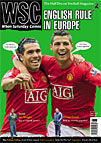 Liam Brady recently caused a stir on Irish TV, jumping to the defence of Arsène Wenger, but ultimately creating a rift in the studio, writes Paul Doyle
Liam Brady recently caused a stir on Irish TV, jumping to the defence of Arsène Wenger, but ultimately creating a rift in the studio, writes Paul Doyle
An amusing side-effect of Arsenal’s devotion to playing football “the right way” is that they tend to equate defeats with defacing the Mona Lisa. There is something in the righteous grieving of Arsène Wenger that implies we should all mourn with him when the Gunners are downed – as if sport itself, not just his team, has come up short. The last thing anyone associated with Arsenal wants at such sombre moments is for some mischievous boor to break his arse laughing. Last month on RTE, then, Liam Brady was in the wrong place at the wrong time.
The Irish state channel began its post-match analysis of Liverpool’s Champions League elimination of Arsenal by focusing on Wenger’s touchline histrionics and showing a montage of similar antics recorded during their league match three days previously. A giddy Eamon Dunphy scoffed that the Frenchman “looked like John Cleese doing the Ministry of Funny [sic] Walks”. Brady, a normally composed fellow panellist but also the head of Arsenal’s academy, didn’t see the funny side. “That is terrible. That is diabolical. Diabolical,” he thundered oh so seriously.
When Dunphy insisted that it was fair analysis, an indignant Brady railed: “That wasn’t analysis, it was a set-up. You had it in the can before the match. It suggested he’s lost the plot… whereas all we saw was a man who was frustrated at not getting his just deserts. Showing it was a bad, bad decision.”
“I don’t think it was a bad decision,” replied Dunphy, warming to the fight. “In fact, I was part of the editorial group that discussed it. You weren’t because you were off doing a press conference all day.”
That was a key dig: Brady had been off explaining his new role in the Ireland coaching set-up under Giovanni Trapattoni and Dunphy appeared to be hinting that his new raised profile, combined with his involvement with Arsenal, had rendered him overly sensitive. Then Dunphy went further, seemingly suggesting that Brady had become a hypocrite: “We’re entitled to do our analysis and Arsène Wenger and Arsenal are subjected to it the same as everyone else,” he lectured, before snottily adding the sort of jibe punks throw at bands who sign for major labels: “You’ve jumped over the fence, baby.”
“If I’d known you had that in the can I wouldn’t have come on the show,” harrumphed Brady, before viewers had the surreal sight of the other panellist, a certain Graeme Souness, interjecting to act as peace-maker.
Although reportedly he threatened to boycott the show in protest at the ridiculing of Wenger, Brady was back for the Champions League semi-finals later in the month, this time with arguably an even more incongruous calming influence: former Leeds hardcase John Giles. They refrained from directly referring back to Arsenal’s woes, but Brady and Dunphy continued sparring, albeit via proxy subjects. Hence the first thing Dunphy announced after Manchester United’s trip to Barcelona was: “Liam doesn’t want me to say this but I’m going to anyway: tonight Ronaldo was a disgrace to football. His petulance, his temperament, constantly throwing himself on the ground… Ronaldo is a cod.”
Brady just shook his head. But he could have reminded viewers that earlier in the season Dunphy dismissed Ronaldo as “a puffball” who “will never be a player as long as he has a hole in his arse” only to recant in his tabloid column a few weeks later by writing: “Ronaldo is something special… the real deal… I was wrong.”
Instead Brady diplomatically shifted the spotlight on to Alex Ferguson’s negative tactics and team selection, opining: “There were some managerial decisions that baffled us tonight.”
“I hope we won’t be saying the same thing about you with Ireland,” shot back anchorman Bill O’Herlihy, hitting Brady’s weak spot. “I am not the manager, Bill,” retorted Brady, showing the exasperation of a man who knows that soon, no matter how minor his role under Trapattoni, he could feature in one of Dunphy’s montages.
From WSC 256 June 2008